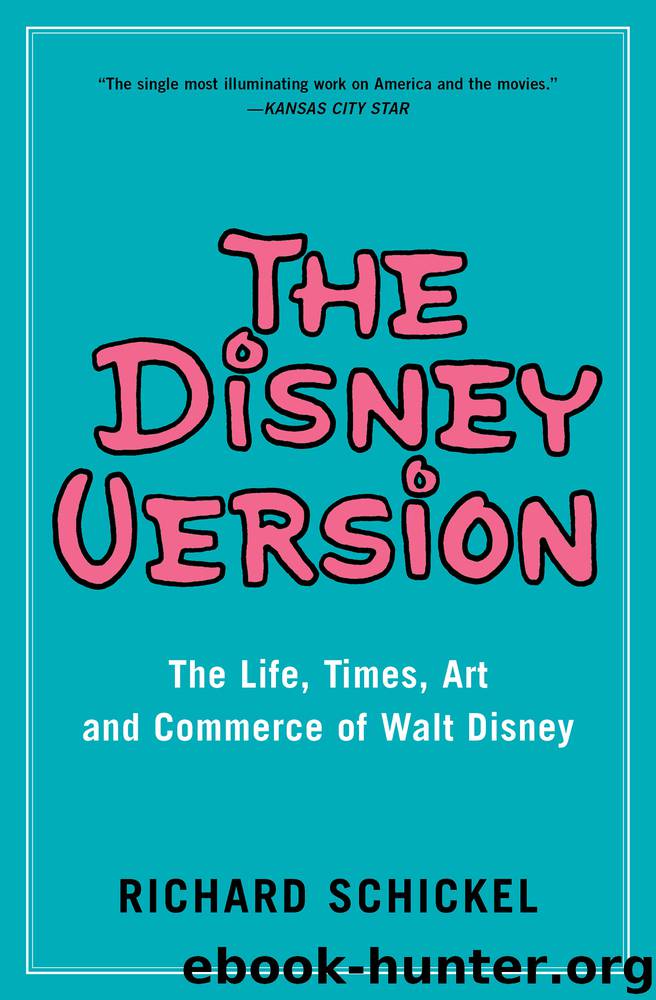The Disney Version by Richard Schickel

Author:Richard Schickel
Language: eng
Format: epub
Publisher: Simon & Schuster
Published: 2019-08-31T16:00:00+00:00
22
Clearly, mythology is no toy for children.
—Joseph Campbell, The Masks of God: Primitive Mythology
IN RECENT TIMES most people have preferred to think of mythology in general and the folktale in particular—the latter is admittedly not quite such a serious matter—as children’s playthings. In a much quoted simile, J. R. R. Tolkien has pointed out that the fairy tale has been retired to the nursery as old furniture is retired to that place, not because the children like it so much, but because their elders no longer care for it. They have thus achieved, in our time, a kind of cultural neutrality, particularly in the minds of the unbookish mass audience. They are considered safe, moral, entirely suitable for innocent eyes. It is a very naïve view, as Disney was to discover once he began trying “to lick” the story (as they say in Hollywood) and as at least some members of his audience were to discover when their children had to be carried from the theater screaming at even the fairly mild, often gently charming version of Snow White that Disney finally made.
It is necessary to conceive of fairy tales in a more complex way if one is to understand the way they work on us. As C. S. Lewis observed, “Many children don’t like them and many adults do.” Which means, of course, that their appeal is more universal in one way than many people suppose (it is not confined to a single age group) and less universal in another way (there are some people who are constitutionally unable to respond to them no matter what their age, education or station in life). It is easy to see what Disney liked about the form. It imposes on the teller certain restrictions cited by Lewis—“brevity, its severe restraint on description, its flexible traditionalism, its inflexible hostility to all analysis, digression, reflections and ‘gas.’ ” These were criteria Disney insisted upon in all the works that emanated from his studio, no matter what their subject matter. Liking the fact that folk stories are the most nonliterary of all literary forms, he also appreciated the informality of their composition, for as Joseph Campbell says, the folktale is “told and retold, losing here a detail, gaining there a new hero, disintegrating gradually in outline, but re-created occasionally by some narrator” in an entirely democratic fashion—“an art on which the whole community of mankind has worked.”
Disney, in the ineffable style of his early days as a theoretician of aesthetics, seemed to agree with this definition when he offered his own definition of culture to a wandering scholar. The very word, he said, “seems to have an un-American look to me—sort of snobbish and affected—as if it thought it were better than the next fellow. Actually, as I understand it, culture isn’t that kind of snooty word at all . . . a fellow becomes cultured, I believe, by selecting that which is fine and beautiful in life, and throwing aside that which is mediocre or phoney.
Download
This site does not store any files on its server. We only index and link to content provided by other sites. Please contact the content providers to delete copyright contents if any and email us, we'll remove relevant links or contents immediately.
Waking Up in Heaven: A True Story of Brokenness, Heaven, and Life Again by McVea Crystal & Tresniowski Alex(37763)
Still Foolin’ ’Em by Billy Crystal(36327)
Cecilia; Or, Memoirs of an Heiress — Volume 1 by Fanny Burney(32523)
Cecilia; Or, Memoirs of an Heiress — Volume 2 by Fanny Burney(31928)
Cecilia; Or, Memoirs of an Heiress — Volume 3 by Fanny Burney(31912)
Fanny Burney by Claire Harman(26579)
Empire of the Sikhs by Patwant Singh(23057)
We're Going to Need More Wine by Gabrielle Union(19019)
Hans Sturm: A Soldier's Odyssey on the Eastern Front by Gordon Williamson(18550)
Plagued by Fire by Paul Hendrickson(17391)
Out of India by Michael Foss(16837)
All the Missing Girls by Megan Miranda(15878)
Cat's cradle by Kurt Vonnegut(15293)
Pimp by Iceberg Slim(14461)
Molly's Game by Molly Bloom(14119)
Bombshells: Glamour Girls of a Lifetime by Sullivan Steve(14036)
For the Love of Europe by Rick Steves(13790)
Leonardo da Vinci by Walter Isaacson(13281)
4 3 2 1: A Novel by Paul Auster(12352)
